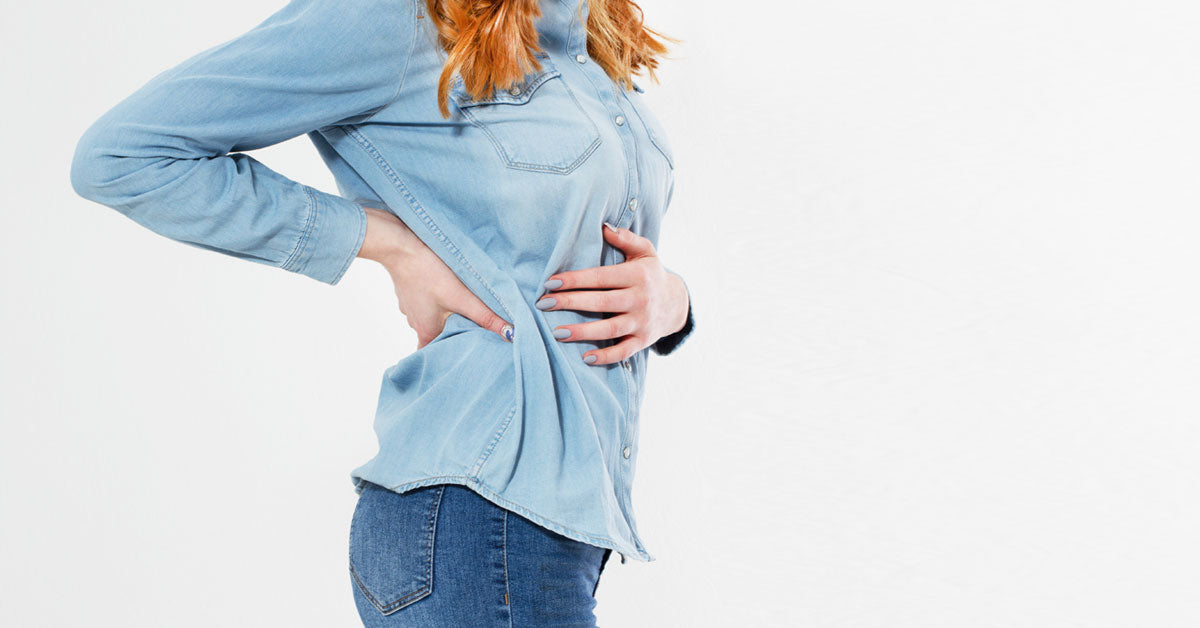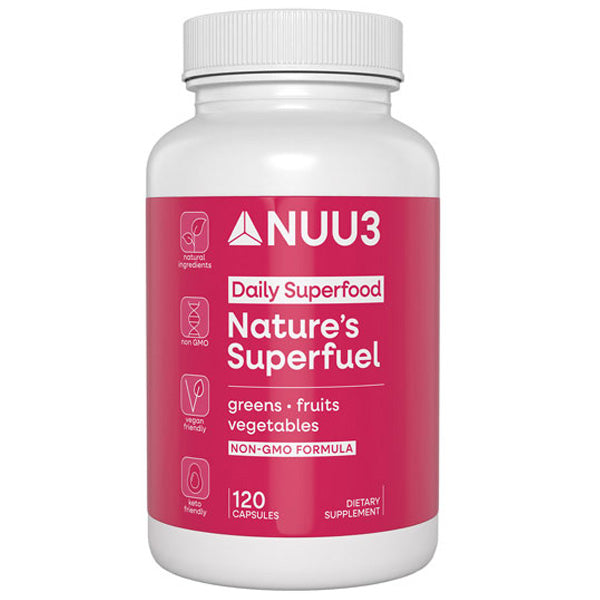7 Ways You Can Reduce Period Bloating

Dealing with period bloating can be frustrating, but there are effective ways that relieve the discomfort brought about by this condition. We will take a look at the causes of bloating during your period, what it is like when you feel bloated, and what you can do to reduce the uneasiness.
What is period bloating?
Period bloating refers to a swollen or tight feeling in your belly that occurs in the days leading up to your period, as well as during the first few days of bleeding. It's typically caused by hormonal shifts that lead to temporary water retention and gastrointestinal issues like gas and constipation. Along with abdominal swelling, you may also experience breast tenderness, fatigue, headaches, and other PMS symptoms.[1]
What causes period bloating?
Many women experience increased gas before period due to hormonal shifts slowing digestion and increasing intestinal inflammation.
Rising estrogen levels in the lead-up to menstruation cause your body to retain more water and sodium, leading to swelling and period bloating. At the same time, dropping progesterone levels relaxes the muscles in your digestive tract, slowing down digestion. This combination of fluid retention and sluggish digestion leads to a bloated, uncomfortable feeling.[2]
You may be wondering, "Why am I so gassy on my period?" This gastrointestinal distress is due to an increase in prostaglandin-driven inflammation and the hormonal shifts that slow digestion. Immune-related inflammation triggered by these hormonal changes can also contribute to the gassy feeling.
Chemicals called prostaglandins are released to promote uterine contractions to protect the uterine lining, but these can spread and spark inflammation throughout the body, exacerbating bloating and other PMS symptoms.
What does bloating feel like?
Bloating can make parts of your body feel swollen, puffy, tight, and uncomfortable. Along with abdominal bloating, you may also experience bloating or swelling in the fingers, feet, chest, or face.
It’s common to feel increased gas and abdominal rumbling along with a distended stomach. You may feel short of breath or that your clothes, shoes, or jewelry are tighter than usual. The level of discomfort ranges from mild to severe or even painful.
At what point in your period are you the most bloated?
Most women experience the worst period bloating on the first or second day of their periods. This lines up with peak water retention triggered by the hormonal crash just before bleeding. Within a day or two after your period starts, hormones begin rising again, which brings relief from bloating for most.
Keeping a symptom diary for a few months can help you identify when you typically feel most bloated. Some report increased bloating during ovulation (roughly mid-cycle) when another hormonal shift takes place while others experience peak bloating just before and in the first couple of days of their period. Some also report issues with bloating after period has ended.
How you can reduce period bloating?
1. Stress reduction
Chronic stress can make you more sensitive to shifts in estrogen and progesterone. This stress exacerbates period symptoms like bloating.[3]
Engaging in relaxing activities like meditation, yoga, massage, deep breathing, and moderate exercise helps counteract stress and minimize PMS symptoms. Supplements specifically designed for stress reduction, such as NUU3 Keep Calm Gummies, can help you relieve stress.
2. Decrease salt intake
Consuming excess sodium causes your body to retain more fluid, worsening bloat and water retention. Avoid adding extra salt to foods and limit eating processed foods high in sodium. Potassium helps counterbalance sodium; eating potassium-rich foods like leafy greens, bananas, potatoes, and tomatoes helps reduce bloating.[4]
Avoiding gassy foods like beans, dairy, carbonated beverages, and artificial sweeteners before your period may help reduce bloating and gas before period.
3. Exercise regularly
Staying active with light exercise can help alleviate gastrointestinal issues that lead to gas before period and combat fluid retention that results in bloating.[5]
Regular cardio and strength training can reduce menstrual discomfort and PMS symptoms, including bloating. Aim for 30 minutes daily of moderate exercise like brisk walking, swimming, cycling, or light strength training. Be sure to drink plenty of water before, during, and after exercise.
4. Drink lots of water
Drinking adequate water minimizes gas and constipation. Herbal teas like mint, ginger, or fennel teas reduce gastrointestinal distress.
5. Sleep
Disrupted sleep increases sensitivity to discomfort and pain from menstrual cramps, headaches, and, bloating. Prioritize getting seven to nine hours of quality sleep per night.[6]
Maintain a regular sleep-wake cycle and avoid screens before bedtime. You can consider supplements specifically designed to promote deeper sleep, such as NUU3 Sleep Support Gummies.
6. Avoid alcohol and caffeine
It’s best to avoid caffeine and alcoholic drinks before your period. They disrupt proper digestion, cause inflammation, and stimulate bloat-promoting hormones like cortisol and insulin. Consider taking NUU3 Gut Health 365 if you need extra digestive help.
7. Try diuretics
Foods and supplements with natural diuretic effects increase urine output to flush out excess sodium and water from your system. While there's no instant fix on how to get rid of period bloating immediately, taking an over-the-counter diuretic medication can provide quick relief by flushing out excess fluids.
Helpful options include potassium-rich foods like spinach and supplements such as vitamin B6, dandelion, and bunch. Supplements like ginger, fennel, peppermint oil, and probiotics have antispasmodic effects to decrease gas before period, potentially minimizing bloating.
Always consult your doctor before taking any medicine or new supplements as he knows how these would affect your body and contribute to your overall well-being.
FAQ
Do you gain weight before or during your period?
It’s common for the scale to go up by two to six pounds due to water weight before your period and the first few days into it due to fluid retention and digestive backup. This temporary bloating often causes clothes to fit tighter. However, once hormone levels stabilize again, the fluid is released, and most find they go back to their regular weight.
Should you eat more on your period?
Energy needs don’t directly increase during your period, but it is important to eat a balanced diet with plenty of iron-rich foods to counteract blood loss. Some find small, frequent, nutrient-dense meals can help minimize discomfort from cramps, headaches, nausea, and diarrhea. Don’t give in to cravings when you have your period as these are your body’s way of seeking relief for your uneasiness.
Do you burn more calories during your period?
You don’t burn substantially more calories when menstruating. However, some do experience an uptick in resting calorie burn of 50 to 100 extra calories per day.
Changes in hormone levels may slightly boost metabolism. Fluid retention can also increase body temperature and heart rate. Engaging in light exercise as part of your regular activity can also minimize discomfort and regulate energy needs.
Conclusion
Period bloating may be an inevitable part of your menstrual cycle, but simple lifestyle measures can help provide relief.
Be aware of period bloating peaks so you can be ready to counteract them. Reducing salt, staying active, managing stress, and getting enough sleep and water can help minimize monthly suffering.
If you experience extreme bloating during period that severely hinders your daily activities or lasts for many days, be sure to consult your doctor to find out whether an underlying condition could be causing or contributing to it.
References
1] ↑Malagelada JR, Accarino A, Azpiroz F. Bloating and Abdominal Distension: Old Misconceptions and Current Knowledge. American Journal of Gastroenterology. 2017;112(8):1221-1231. doi:
2] ↑Critchley HOD, Babayev E, Bulun SE, et al. Menstruation: Science and society. American Journal of Obstetrics and Gynecology. 2020;223(5). doi:
3] ↑Jiang Y, Greenwood-Van Meerveld B, Johnson AC, Travagli RA. Role of estrogen and stress on the brain-gut axis. American Journal of Physiology-Gastrointestinal and Liver Physiology. 2019;317(2):G203-G209. doi:
4] ↑Rakova N, Kitada K, Lerchl K, et al. Increased Salt Consumption Induces Body Water Conservation and Decreases Fluid Intake. The Journal of Clinical Investigation. 2017;127(5):1932-1943. doi:
5] ↑Codella R, Luzi L, Terruzzi I. Exercise has the guts: How physical activity may positively modulate gut microbiota in chronic and immune-based diseases. Digestive and Liver Disease. 2018;50(4):331-341. doi:
6] ↑Alexandre C, Latremoliere A, Ferreira A, et al. Decreased alertness due to sleep loss increases pain sensitivity in mice. Nature Medicine. 2017;23(6):768-774. doi:













